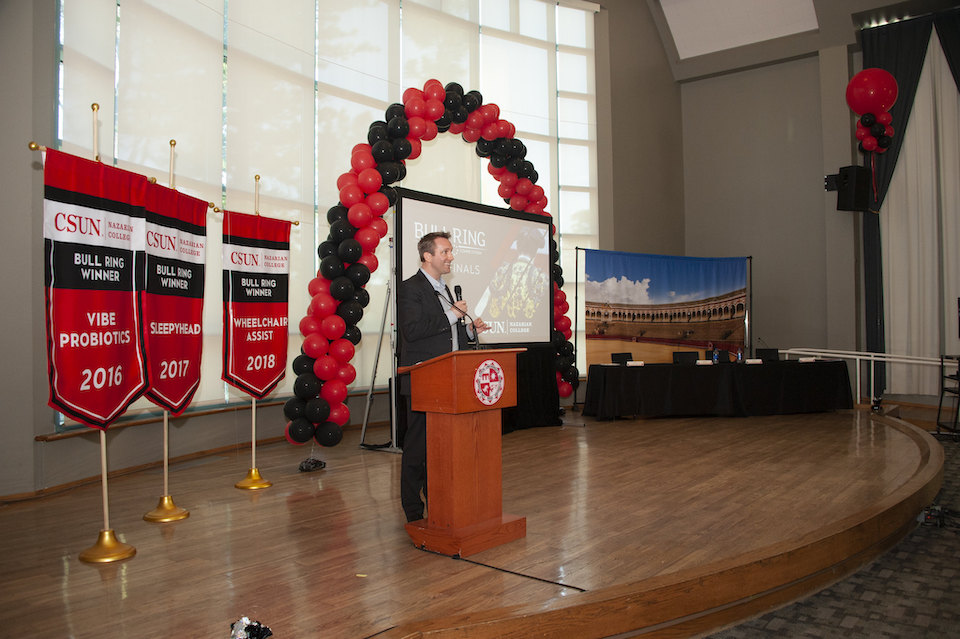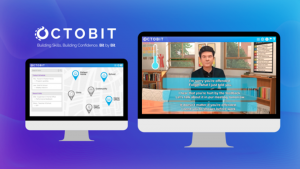Student Team ‘Octobit’ Captures First Place in Bull Ring New Venture Competition

The Bull Ring New Venture Competition gives Matadors an opportunity to present their new venture ideas to an audience while developing a willingness to experiment. Ryan Holbrook, director of the CSUN Entrepreneurship Program, introduces finalists at the 2019 Bull Ring finals. Photo courtesy of Ryan Holbrook.
From a system that allows universities to detect plagiarism in a computer coding sequence to an app designed to connect people with moving companies, this year’s Bull Ring New Venture Competition was packed with innovative business concepts.
With more than 100 people in attendance, CSUN’s David Nazarian College of Business and Economics hosted the 7th annual Bull Ring New Venture Competition finals virtually on April 26, with five finalist student teams competing for $10,000 in total cash prizes.
Open to all current CSUN students, the competition is intended to give Matadors an opportunity to put their creativity and knowledge into practice, preparing them to present their new venture ideas to an audience while developing a keen willingness to experiment.
First place this year was captured by Octobit, an online, simulation-based training platform designed to help users such as behavioral clinicians and therapists better develop their communication skills with clients in clinical settings.
Through their own experience in behavior analysis, founder AnAn Chang ’21 (M.S., Applied Behavior Analysis) and co-founder and graduate student Ryan Moradpour noticed that their fellow behavioral clinicians often had a hard time interacting with their patients — who have learning and/or developmental disabilities — and learning how to explain their medical knowledge in a more accessible manner.
“A huge piece that’s missing that [is] really leading to a lot of issues with our clients, a lot of turnover and just poor job satisfaction, is that our fellow clinicians don’t know how to interact with their clients on a personal level,” said Moradpour, a master’s student in the Applied Behavior Analysis program.

A graduate-student initiative, Octobit captured first place with its innovative design.
By creating Octobit, Chang and Moradpour hope to improve the lives of clinicians, companies and their patients by helping clinicians deliver compassionate care with confidence during therapy sessions. The training platform presents students with a variety of scenarios they will encounter in real life and gives them options on the best ways to communicate with patients and their family members. Based on the option chosen, the program then gives feedback to the behavioral clinicians and educates them on what they did right or wrong.
“When clinicians are comfortable with delivering compassionate care, their patients are more satisfied, they keep their appointments and they recommend their clinicians to other friends and families,” Chang said.
Throughout the Bull Ring competition, which began in March with 20 teams, participants had access to free workshops, dedicated mentoring and coaching sessions to learn more about entrepreneurship, receive critical feedback on their product concept and business plan, and hone their ideas for the final event.
“Our students have been putting a lot of work into their new venture ideas, and the competition has been incredibly competitive,” said Ryan Holbrook, director of the CSUN Entrepreneurship Program.
In addition to Octobit, this year’s finalists were SubmitIt, a system for instructors to check for plagiarism in computer coding sequences; Canmove, an online platform that connects users to independent drivers and moving companies; Vanzari, an online resource for music fans and professionals that displays renowned artists’ album sales; and Atra, a cost-effective and customizable alternative to standard memorial headstone markers. Awards included an Audience Choice Award winner determined by a live vote; this year’s winner was Vanzari.
“These students are not just business majors, but come from all majors across campus, are interdisciplinary thinkers and are truly emerging as the change-maker generation shifting what it means to be an entrepreneur,” said professor Joanne Scillitoe, the inaugural Paul Jennings Chair in Entrepreneurship.
Since its inception, the competition has been supported by alumnus Jeff Marine and his family, allowing CSUN students to keep developing their entrepreneurial skills and make their visions a reality.
Each finalist team delivered a five- to- seven-minute pitch, followed by a Q&A with a panel of judges, who delved into their business models, potential for profitability and market opportunity. This year’s distinguished panel of judges included Rick Friedman, CEO and founder of boutique law firm NovusGC; Allen Lin, founder of blockchain startup NeonBase; Raychel Espiritu, venture outreach manager at the Alliance for Southern California Innovation, and Cole Christie, a senior consultant at Deloitte specializing in the tech industry.
After the finalists’ pitches, guest speakers Paola Alvarado and Tehami Syed, students from Granada Hills Charter High School, took the floor to present their own initiative, DETOX — an air purifier to help factories reduce their carbon emissions.

 experience
experience